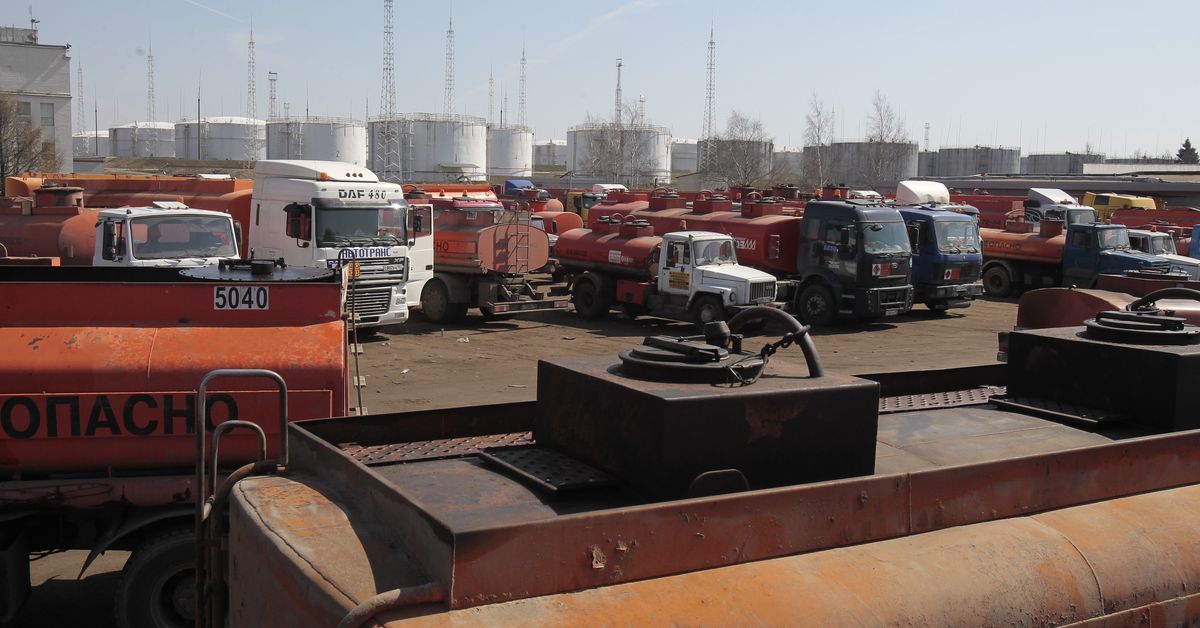Empty petrol tankers wait to fill up at a tanker filling station some 30km (18 miles) outside Moscow April 27, 2011. REUTERS/Alexander Natruskin/File photo Acquire Licensing Rights
MOSCOW, Aug 31 (Reuters) – Russia, one of the world’s biggest oil producers, has faced shortages of fuel crucial for gathering the harvest in some parts of its southern breadbasket and the situation may get worse in coming months, market sources told Reuters.
Traders said that the fuel market has been hit by a combination of different factors including maintenance at oil refineries, infrastructure bottlenecks on railways and the weaker rouble which incentivises fuel exports.
Russia has tried to tackle diesel and gasoline shortages over recent months, contemplating export curbs as the last-ditch attempt to prevent a serious fuel crisis – which is sensitive for the Kremlin ahead of a presidential election in March.
A government decision to cut subsidies for refineries is likely worsen the availability of fuel in the world’s biggest grain exporter.
Regional oil product depots in Russia’s southern regions have had to cut or even suspend fuel sales, while retail filling stations were forced to limit fuel sale volumes to customers.
“The Ai-92 gasoline is not available for retail sales in Krasnodar region, Adygea and Astrakhan, there is hardly any Ai-95 gasoline and diesel,” a trader in Russia’s south said.
Another trader said there have been no diesel sales at oil depots and there is no diesel on retail markets for the second week running in the whole Samara region, located in the Volga river region.
Russian Deputy Prime Minister Alexander Novak said on Wednesday that there were no fuel shortages.
But he also said government was working on measures to ensure a stable supply of it on the domestic market, including increasing levels of mandatory sales on exchanges and limiting the number of exporters.
FUEL CRUNCH
Traders said the shortages on the retail market followed by a sharp rise of wholesales prices. The state caps the retail prices, ordering the sellers to raise prices of gasoline and diesel only in line with official inflation.
Industry sources say the situation will improve no earlier than October when many oil refineries will wrap up their maintenance, while seasonal demand is expected to decline.
Some farmers also complained about scarcity of fuel.
“There are shortages of fuel … oil products prices rose in the range of between 10% and 20%,” Andrei Neduzhko, director general of agricultural holding Step said in written comments.
His company operates in Russia’s southern regions of Rostov, Krasnodar and Stavropol. He said, however, there are no risks to the autumn sowing campaign for his holding.
Wholesale diesel prices started to sharply rise in July. For the past two months commodity exchange diesel prices jumped on average by more than a quarter to 67,000 roubles ($700) per ton.
“We do not buy. The prices are crazy,” an owner of a fuel depot said.
The energy ministry said last week that the volume of Russia’s oil products output fully met current demand for fuel, taking into account the redirection of some gasoline and diesel exports to the domestic market as well as the use of stockpiles.
The energy ministry also was recommending earlier this month that oil companies find ways to curb wholesale fuel price rises in agricultural regions.
It has said in a statement that some supply issues had arisen due to high congestion on railways in southern Russia during the tourism season.
Russian Railways has said it was in discussions with oil producers, and were ready to solve the issues.
It also said in comments to Reuters that fuel supplies to southern regions via railways do not depend on an increase in passenger traffic.
“All requests for the transportation of fuel on domestic routes are given a priority … and “almost 100% of all products are delivered on time,” it said.
($1 = 95.6955 roubles)
Reporting by Reuters; writing by Vladimir Soldatkin; editing by Guy Faulconbridge and David Evans
Our Standards: The Thomson Reuters Trust Principles.
Read the full article here





